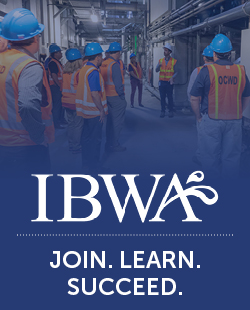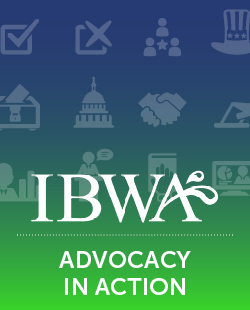February 22, 2002
Director: Mr. Paul J. Tierney
Food Protection Program
Division of Food and Drugs
Department of Public Health
305 South Street
Jamaica Plain, MA 02130-3597
Dear Mr. Tierney:
The International Bottled Water Association (IBWA) sincerely welcomes the opportunity to provide comments on Redraft #6 of 105 CMR 570.000, proposed regulation addressing the manufacture, collection, and bottling of water and carbonated non-alcoholic beverages. IBWA also appreciates the ability to participate on the Advisory Committee for the Department of Public Health.
IBWA is the trade association representing the bottled water industry. Founded in 1958, IBWA member companies account for more than 80 percent of all bottled water sales in the U.S. The association membership includes domestic and international bottlers, distributors, and suppliers.
IBWA supports the Department’s efforts to harmonize the Commonwealth of Massachusetts’ bottled water regulations with the U.S. Food and Drug Administration’s (FDA) bottled water regulations. The incorporation of, by reference, FDA regulations will assist in compliance with and understanding of the Department’s regulations. However, below are listed a few suggestions we feel will improve the draft regulations. IBWA respectfully offers these suggestions to ensure the regulations will address potential future issues without extensive revisions.
105 CMR 570.003: Definitions
Discussion: IBWA has concerns with the definition of “minimal treatment” as it is used in the draft regulations, particularly in relation to “natural spring water.” The current definition is too prescriptive on the use of technologies. FDA policy and the IBWA Model Code recognize the potential need to selectively remove or reduce naturally occurring undesirable elements. In fact, FDA’s comments in the November 13, 1995 Federal Register stated that “in some instances, the water can be treated to selectively remove these undesirable elements” and “the agency finds that the IBWA Code and state requirements are basically consistent with FDA’s informal policy on ‘natural’ because the product is only minimally processed.”
In 2000, IBWA developed the following Performance Standard Regarding the Removal of Undesirable Elements from Bottled Water:
A process to remove any undesirable element must be selective and not alter the water significantly. As long as such processing is selective and otherwise complies with FDA’s stated policies on use of the term ‘natural’, such processing shall not preclude labeling the product as ‘natural’. Also the same minimal treatment of spring, mineral, artesian, or well water to selectively remove or reduce the concentration of naturally occurring undesirable elements shall not preclude labeling the product ‘spring water’, ‘mineral water’, ‘artesian water’, or ‘well water’, as appropriate, as long as all other requirements of the applicable standard of identity are met. If the process alters the water significantly that fact must be reflected in the Statement of Identity and the product can not be labeled ‘natural’.
As currently drafted, the public health would not be best served by limiting the development of technologies to remove or reduce the concentration of naturally occurring undesirable elements. It will discourage companies from providing a safer, purer product by prohibiting them from labeling their product with the appropriate Standard of Identity, while using such minimal treatment to selectively reduce or remove particular undesirable elements.
Suggestion: IBWA respectfully offers the following language to replace the current definition of minimal treatment:
“Minimal treatment” means treatment limited to the use of filters (paper, activated carbon, and/or particulate); ozonation; ultraviolet light; and other processes that selectively remove undesirable elements to directly assure compliance of the product with the quality standard in 105 CMR 570.008(A).
105 CMR 570.007: Water Source Protection, Treatment and Modification for Bottled Water and Carbonated Non-Alcoholic Beverages
Discussion: The time period for test analysis needs to be lengthened under (A)(6)(b) of this section. By requiring the chemical and physical analysis to be taken within the previous six months, the regulations could require additional testing that will unlikely differ from the annual tests performed on the source water.
The use of a new or substantially modified source water under (A)(7) of this section will require prior approval from the Department before a bottled water company could utilize the source water. The draft regulations, however, do not prescribe a time frame for review by the Department. In order to effectively manage bottled water operations, a maximum period for review by the Department should be included. Without such a requirement, planning and management of bottled water production could be negatively impacted.
Finally, IBWA recommends that the Department develop a source test monitoring waiver program in order to reduce the paperwork and costs associated with testing for elements that are not present and unlikely to be present in source water. California recently initiated such a system with the support of the bottled water industry. Attached for your consideration is a copy of the California waiver program.
Suggestion: IBWA suggests the last sentence under (A)(6)(b) be modified to read as follows:
“The analysis shall been completed within twelve months prior to the first use of the source water, with the exception of the microbiological analysis, which shall have been performed within the two weeks prior to the first use of the source water.”
In addition, IBWA suggests the following language be added to (A)(7) after the first sentence.
“The Department shall complete their review of new or substantially modified sources within 60 days of receipt of a completed requested.”
150 CMR 570.009: Sampling and Testing Requirements
Discussion: The comments above on 570.007 also apply to this section. The time frame for microbiological testing within (A)(1)(d)(iii) and (A)(2)(d)(ii). In addition, IBWA strongly suggests the inclusion of a waiver program as mentioned above.
Under (C)(2) of this section, a bottled water plant will have to cease operations when they receive any test results indicating the finished product water has exceeded any maximum contaminant level listed in 310 CMR 22.00 or by the Federal Environmental Protection Agency. This strict standard does not recognize the potential for testing errors and false positive determinations that are the result of errors by the laboratory or sampling. The water should be retested when an exceedance notice is received to confirm the results. If the non-compliance is confirmed in subsequent tests, then the provisions of 570.009(C)(2)(a)-(d) should apply. IBWA has addressed this issue in Appendix C of the IBWA Model Code.
Suggestion: The following language attempts to address the potential for errors in testing without requiring bottlers to cease operations if there has been an error made by the testing laboratory. By adding the word “confirmed” before test, a false positive or error can be identified before a bottler would be required to cease operations.
“When a plant receives a confirmed test result that any of its finished product is not in compliance with any standard of quality in 21 CFR § 165.110(b), it shall:”
150 CMR 570.012: Labeling Requirements
Discussion: Under (C)(2) of this section, bottled water must include the source on the label. Presently, all packaged foods, including bottled water, have extensive labeling requirements, including the statement of identity, compliance with the definitions in the Standard of Identity, ingredient labeling, name and place of business of the manufacturer, packer or distributor, and nutrition labeling, if it is so required. Any other information FDA may wish to require by regulation must be considered a material fact. Specifically regarding source labeling, FDA concluded in the preamble to the Standard of Identity Final Rule that this information was not a material fact and, therefore, not required to appear on a bottled water label (60 Fed. Reg. 57076, 57096). IBWA recommends that this section be deleted from regulation since it has been addressed and rejected by FDA.
Under (C)(3), the Department has eliminated the requirement that was contained in an earlier draft that the local permit number be included on bottled water labels. However, the Department has included a requirement for a permit number in the current draft of the regulations. With the expected enactment of HR 3448, the Public Health Security and Bioterrorism Response Act, inspectors will have access to a listing of all food facilities, including bottled water facilities, and the corresponding registration number of those facilities. Therefore, the need for the requirement for bottled water labels to include a permit number is evident. If the Department insists that bottled water labels include a permit number, the Federal registration number should be used for compliance with this regulation. Although the Federal government does not intend to require the number on food labels, it would be significantly easier to manage one federal number than a variety of state numbers.
Suggestion: IBWA urges the provisions for source labeling and permit numbers for bottled water labels be deleted in the regulations for reasons stated above.
150 CMR 570.013: Supplemental Regulations for Processing and Bottling of Bottled Water and Carbonated Non-Alcoholic Beverages
Discussion: IBWA has recently addressed the use of equipment for multiple purposes in the IBWA Model Code. Under (C) of this section, the Department permits the use of multi-purpose equipment, except for food and beverages that contain fat or protein. The IBWA Model Code now permits the use of multi-purpose equipment for the production of bottled water so long as the equipment is not used for milk, other dairy products, and non-beverage foods. The bottler is also required to use proper sanitation procedures and have established adequate policies and procedures. The IBWA Model Code language addresses the potential for contamination and thus there is not a need to be as specific as (C)(2).
Suggestion: IBWA suggests the following provision as a substitute for the current language in the draft regulations.
“Water intended for bottling shall not be stored, processed, or bottled through equipment or lines used for milk, other dairy products, and non-beverage foods. Non-dedicated beverage equipment and lines used for other beverages shall be sanitized using a hot clean-in-place (CIP) process, or equivalent. The process must be addressed in the plant’s sanitization standard operating procedure (SSOP) manual and HACCP plan, and shall include provisions for monitoring, critical limits, appropriate corrective action, and records.”
150 CMR 570.018: Notification to the Department and the Board of Health
Discussion: Under (B) of this section, a smooth transition in the sale of a bottled water company or facility would not occur. As currently drafted, a new owner would have to cease operations until the new permit is issued, even though there may be no change in the actual operation and production procedures of the facility. Timely notification of a change in ownership is appropriate, but to require a cessation of operations creates a substantial financial and operational burden.
Suggestion: IBWA recommends that a change of ownership require timely notification, but not a cessation of operations.
Conclusion
IBWA again thanks the Department for the opportunity to participate in the development of the regulations and to comment on the most recent draft. We look forward to working with the Department in finalizing the draft of 105 CMR 570.000.
If IBWA can be of assistance to you, or if you need more information, please do not hesitate to contact me.
Sincerely,
Patrick Donoho
IBWA Vice President
Government Relations


